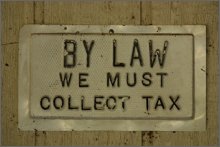10 Key Tax Law Changes You Need to Know For Preparing Your 2005 Taxes
by www.SixWise.com
While the act of filing your annual tax return is set in
stone, tax laws themselves are not nearly as predictable.
As with many prior years, 2005 ended with an array of tax
law changes, many of which may affect your taxes and/or refund.
|

It's common for tax laws to change from year to year;
knowing which changes affect you can save you a significant
amount of money.
|
Before you begin filing your taxes for 2005, take note of
these 10 key tax law changes that may matter to you and your
finances.
1. Standard Deduction Increase
The standard deduction increases each year to account for
inflation. It is to your benefit to itemize your deductions,
and, if it exceeds the standard deduction, to use the itemized
amount on your return. The standard deduction for 2005 is:
-
Married filling jointly or qualifying widow(er): $10,000
-
Heads of Household: $7,300
-
Singles: $5,000
-
Married filling separately: $5,000
For those who are at least 65 years old or blind, an additional
$1,000 deduction is granted if married, another $1,250 if
single.
If you're 65 years or older and blind, a second $1,000 deduction
may be taken for married taxpayers, and a second $1,250 may
be taken for singles.
2. IRA Contribution Limits Rise
In 2005, you can contribute up to $4,000 a year to an Individual
Retirement Account (IRA). Those who are 50 years or older
can contribute an extra $500. The $4,000/year limit will apply
through 2007.
3. Personal Exemption Increase
The personal exemption per family member rose to $3,200 in
2005, up from $3,100 in 2004. If your income is equal to or
higher than:
-
$145,950 for singles
-
$218,950 for married couples filing a joint return
-
$182,450 for head of households
-
$109,475 for married couples filing separately
... your personal exemption deduction will be decreased
by a small amount for every $1,000 your income reaches beyond
this amount (up to a pre-determined ending amount).
|

Though you can't avoid taxes, you can make the most
of your money by contributing the maximum amount to
your IRA, 401(k) and/or other retirement plans.
|
4. Tax Breaks for Married Couples
For those who were married in 2005 or before, the following
tax changes could save you money:
-
For those filing jointly, the 15 percent rate bracket
has been expanded. In 2004, it ended at $58,100. In 2005,
the bracket ends at $59,400.
-
For those filing jointly, the standard deduction has
increased from $9,700 in 2004 to $10,000 in 2005.
5. New Tax Brackets
Although income tax rates are the same as they were in 2004,
income tax brackets have been adjusted to account for inflation.
6. Increase in Contribution Limits for Retirement
Employees may contribute a maximum of $14,000 to 401(k) and
403(b) programs. The maximum employee contribution to SIMPLE
plans is $10,000. Taxpayers can contribute a maximum of $42,000
to self-employed Keogh plans. Additionally, those who reached
50 years of age or older by the end of 2005 qualify for the
following additional "catch-up" increases:
-
An additional $4,000 for 401(k), 403(b), salary reduction
SEP plans, and 457 plans
-
An additional $2,000 for SIMPLE plans
7. Most Mileage Rates Increased
Mileage incurred for business purposes increased twice --
it reached 40.5 cents per mile for January 1, 2005 through
August 31, 2005, and increased again to 48.5 cents a mile
for mileage incurred after August 31 through December 31,
2005.
Mileage for medical transportation expenses and job-related
moves increased to 15 cents for the first period (through
Aug. 31) and 22 cents for the second (through Dec. 31).
|

In 2005, the number of taxpayers filing their taxes
electronically is expected to surpass 50 percent for
the first time.
|
8. Changes for Vehicle, Boat and Aircraft Donations
If you donate
a car, boat or aircraft to charity, the deduction you're
allowed to take is limited to the price the charity is able
to sell your vehicle for. You must get acknowledgement from
the charity at the time of the sale to claim the deduction.
However, you may deduct the vehicle's fair market value instead
if:
-
The charity uses the vehicle in the interim (such as
using it to deliver meals on wheels).
-
The charity significantly improves the vehicle via major
repairs (more than just painting or cleaning).
-
The charity sells or donates the vehicle to a needy
person at a price significantly below market value in
order to help that person.
9. Housing/Charity for Victims of Hurricane Katrina
Those who have housed (free of charge) victims of Hurricane
Katrina for 60 days or more can claim an exemption deduction
of $500 per person, up to $2,000. Those who have used a vehicle
to donate services to a Hurricane Katrina-related charity
are eligible for a charitable mileage deduction of 34 cents
per mile (the usual charitable mileage deduction is 14 cents
per mile).
10. Last Year for Clean Fuel Deduction
Those who purchased a new hybrid vehicle in 2005 can take
a clean fuel deduction of $2,000. This deduction expired at
the end of 2005, to be replaced by a tax credit in 2006.
Recommended Reading
Lower
Your Taxes -- Big Time: Wealth-Building, Tax-Reduction Secrets
from an IRS Insider
Tax Audits:
What Signs Make You More Likely to be Audited by the IRS?
Sources
MSN
Money: 2005 Tax Law Changes
TurboTax:
Summary of Tax-Law Changes
Internal
Revenue Service: Tax Law Changes for Individuals
2005
Tax Law Changes